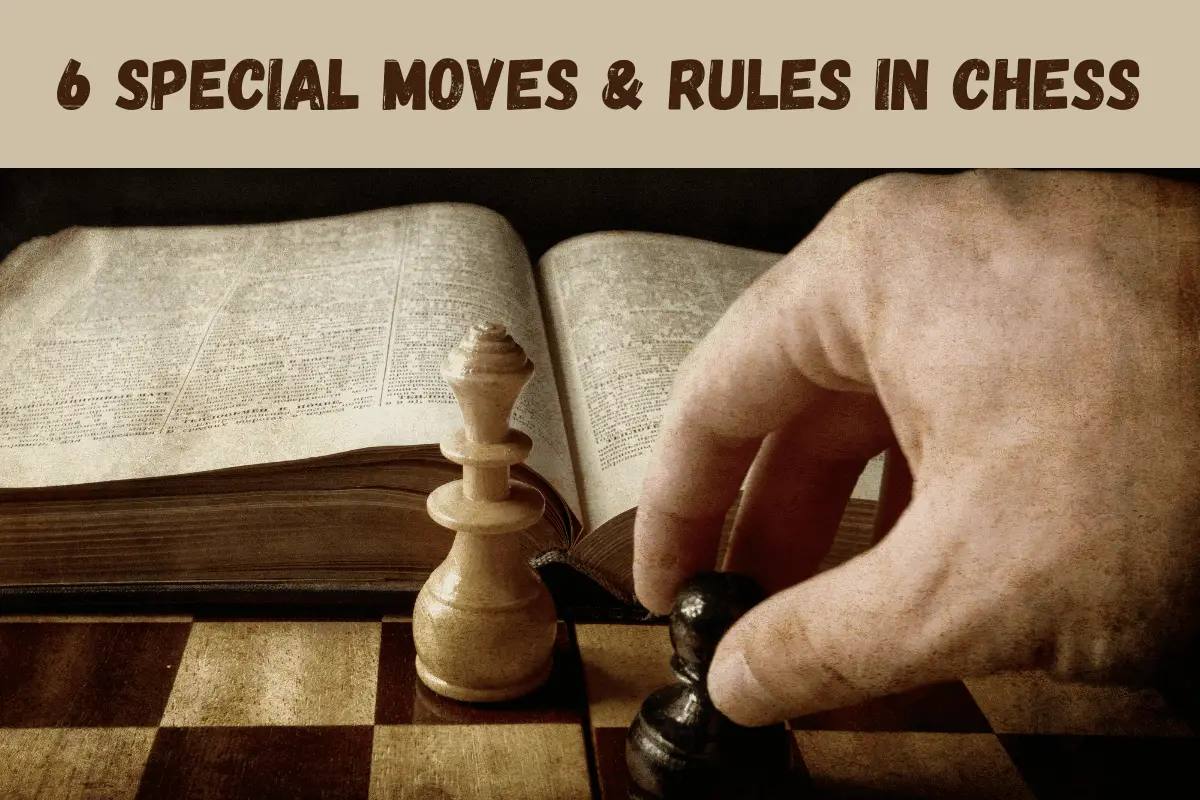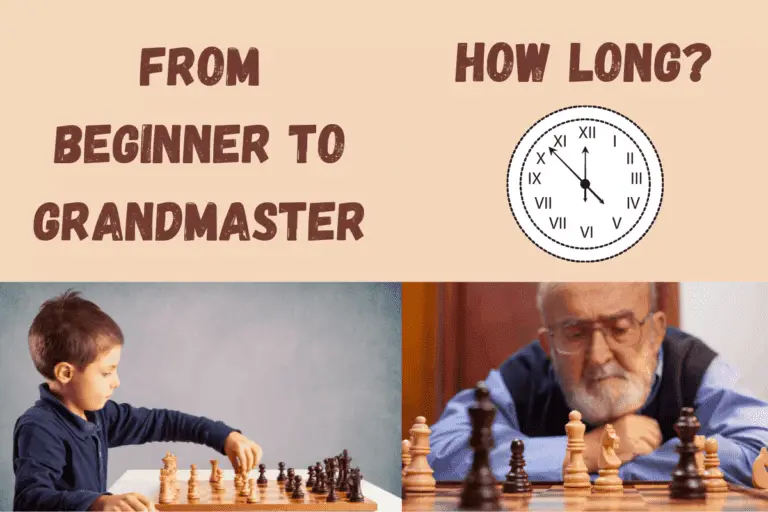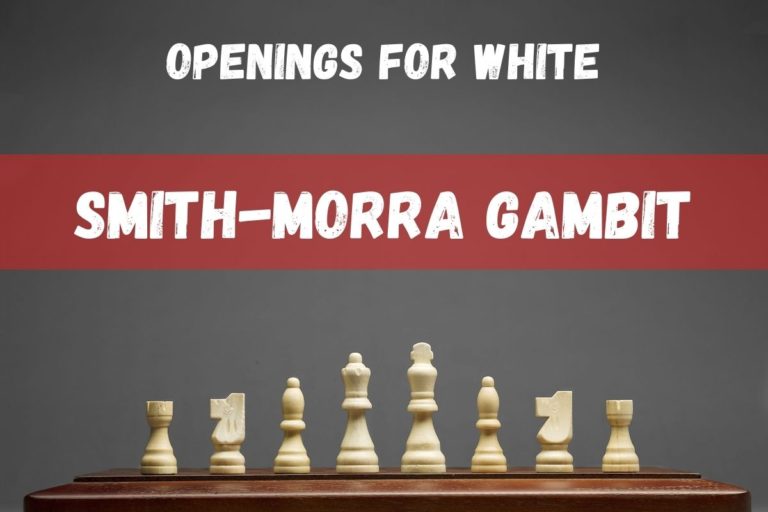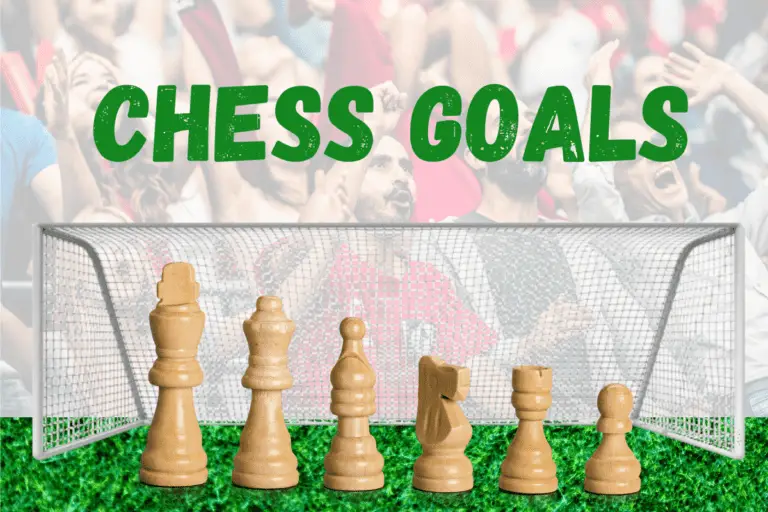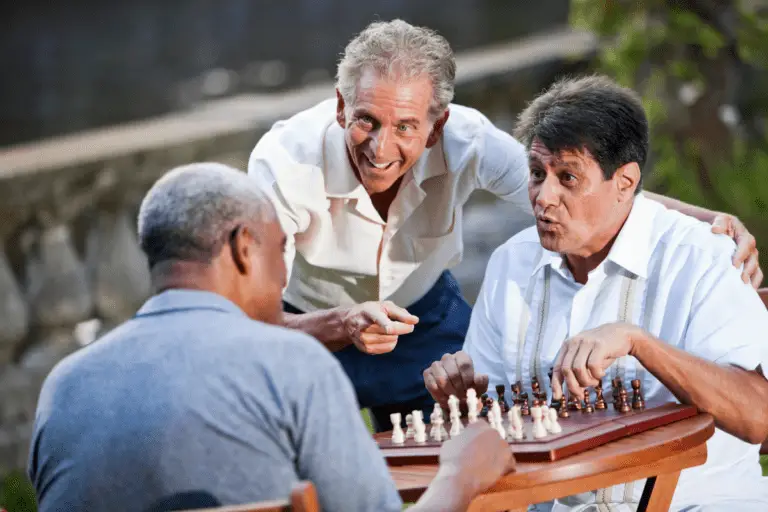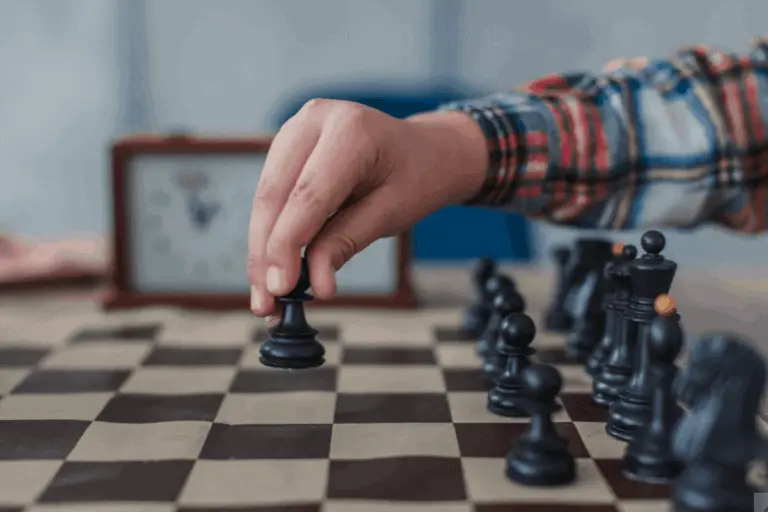19 Smart Moves To Get Good at Chess (Quickly!)
⭐⭐⭐ Take 18 minutes to read and improve your chess game ➡️ : This article was first published on, and is Copyright of Chessquestions.com
Chess is a game that can be played by anyone, but it’s not easy to learn. If you’re just getting started with chess and want to improve your basic skills, here are 11 smart moves guaranteed to help you get good at chess quickly!
These tips are practical advice on some things that will help beginners get better at chess. Following them ensures your skills will improve over time. While you wont become a chess grandmaster overnight, you will see marked improvements in how well they play the game.
- Learn the Basic Rules
- Play Lots of Games
- Analyze Your Chess Games [Easy!]
- Puzzles and more Puzzles
- Training Options
- Study End Games
- Understand Basic Chess Strategies
- Control the Center
- Castle Early
- Learn basic Checkmate
- Avoid Stalemate Situations
- Double-check the threat on every move
- Do not be afraid to sacrifice and exchange pieces
- Don’t Allow Losing to Slow You Down
- Read Chess Books
- Learn Chess Notation
- Join a Chess Club
- Enter a Tournament
- Subscribe to Chess.com Premium
1. Learn the Basic Rules of Chess
I am going to presume you already know the names of the pieces in a game of chess? That would be a good starting point, followed by understanding the rules of how each chess piece can move around the board.
The rules are based almost solely around the individual capabilities of each chess piece and some specials moves that they are able to make. I have just returned to chess some 30 years after I last played. The rules haven’t changed, but I made the effort to read through the rules, and actually discovered some things, that I had not forgotten, but don’t recall ever learning in the first place.
I played a few casual games and realized I was not entirely sure of some things. I printed out the rules and started reading them to understand better how some moves work.
It didn’t take too long to familiarise myself and I was in a better position to pay some real games online once I had gone through them all.
2. Play as Many Games as you Can
There is no doubt, the best way of learning to do something is by doing it. Look at babies, they can’t read instructions, but they figure out how stuff works, or at least works the way they want it to work. We have the advantage of the ability to read, but that can also distract us.
We learn by doing, so go and play as many games as you can, against people or the many online chess engines. And don’t worry about making bad moves and losing games, you are going to have them. Lot’s of them, but you will be learning all the while. You will often find yourself up against a stronger player but these are the games in which you learn the quickest.
This will not only help you get better at chess, but it’ll also increase your enjoyment of the game, and every now and then you’ll beat that strong player, and your confidence will rise, and your thirst for more chess knowledge will increase.
If possible, play with a more experienced player and ask them for advice along the way to improve yourself as well! If there is no one nearby that can teach chess playing skills then try out online opponents.
Do not worry about how bad you are right now, and 100% do not worry about losing. While losing, by watching what your opponent is doing, and when they take advantage of your bad moves, capturing your pieces, you are learning as quickly as you possibly can.
If something happens that you don’t quite understand, replay it over and over until you figure it out. I guarantee, the memory will stick in your mind, and it will be a mistake you will be very wary of before making next time.
I really enjoy playing online as do lots of people, both in daily games and bullet games, to fill a little time on the train or bus, and there is no doubt if I consistently play, I try to win of course, but do not get in knots if I don’t, I do improve and learn fro my mistakes.
For me, I get a lot of my practice learning from others’ mistakes. Watching the chess games other players play and when they lose on one side or another is great for understanding their thinking process, and will soon take you beyond the novice level.
3. Analyze Your Play
One of the greatest tools I have ever used in terms of understanding where I am going wrong is at chess.com and the chess analysis tools.
To be able to go back, scrolling through the moves throughout the game, understanding how good my move was and what the suggested optimal move would have been, is brilliant.
I am so chuffed the more my accuracy improves, and I can see it doing so all of the time when I am fully concentrating on my chess and I feel more than ready for real chess games from there.
The sense of joy I have when I discover I have played the perfect move is fantastic, and it really helps you remember that situation and consider it at a point in the next game you play.
by the same token, when you stand back and really take note of the blunder and mistakes you have made, it is rather more important that you remember those and do not replicate them in the next game you play.
Chess.com provides you with an accuracy score on each game you play. By analyzing each game before playing the next, i promise you, over time you will see improvements in your accuracy score, which means only one thing. You are getting better at chess.
4. Play Puzzles
Puzzles may seem a bit silly to start with, but I promise, you from completing a minimum of 2 puzzles a day, I know I have improved my chess, as I do recall having a situation arise in a game when I am reminded of a puzzle I played in the same or similar situation whereby I was able to mate in one, or set up the checkmate. We’ll come to checkmate patterns more in a minute.
For now, puzzles can be found on the internet, and chess.com themselves have a variety of puzzles at different difficulty levels which you can play to improve your skill level in various aspects; chess tactics (for checkmate), endgame skills & strategy
We are all busy people and often don’t have a huge amount of spare time, but it will take literally just a couple of minutes at most to complete a couple of puzzles on the chess app on your phone. You can do that on the loo!
You should be playing these every day if possible as they will all contribute positively towards improving how well players are able with their game knowledge.
You also get a rating on puzzle play, so there is a challenging element to it as well. This is scored by how many attempts were required to complete the puzzle and how quickly it was completed as well
Also, analyze the puzzle board before rushing in and making the first move. many puzzles require more than one move, so try to understand what the goal of the puzzle is before rushing in and moving a piece. If it is wrong, you gain nothing by being wrong quickly!
An example is given of a puzzle and the player’s move that would have been wrong. One great thing about chess puzzles on this site is they will give you hints if your piece does not work in certain positions! By following these guidelines players can improve their skills at solving difficult problems as well by finding out how to solve them more efficiently than just guessing blindly or moving pieces randomly without understanding what each individual position means for future moves. This allows students who may be hitting plateaus with skill improvement even after practicing regularly to become much smarter people when it comes downing making intelligent strategic decisions.
5. Training
So, training is a big subject, but finding some form of training, whether that be computer training, online training, or real-life chess coach training, will absolutely be of assistance to help make you better at chess.
Most of the time, training is governed by three things
a) How much time you have
If you are looking at one-to-one training with a chess coach, whether that be online or face-to-face, you have to be able to make time for it, and for the most effective results, I would say, keeping a consistent schedule is a good thing too. If you set up weekly meetings and lessons, keep to them, don’t skip. It is easier to get into the habit of skipping lessons than it is to get into the habit of keeping them.
As soon as you skip lessons, your performance will go backward and the money you maybe have spent up to know will have been wasted as you go back to square one.
This brings us nicely onto the cost aspect
b)How much you want to spend [If at all]
One to one coaching or online coaching can cost handsomely. And as mentioned, if you do not have these lessons regularly and commit to the effort, you will be throwing good money after bad.
Another option would be to buy an online course that you can complete at your own pace. These can work out cheaper than a real chess coach, but the same rules really do apply, if you do not complete the courses in a consistent fashion then they could end up being a waste. The saving grace is the fact that you have purchased it, so can go back and start again at any time without additional costs racking up. This suits those of us who are busy people.
You can also get regular lessons from sites like chess.com, you will have to be a subscribed member, but this is the cheaper option, and you get so much with a premium subscription to the site that you may find you don’t really need to concern yourself with more formal training at al to get better at chess
c) How serious you are about improving your chess skills
Do you want to play at the highest level in the chess world or just be better than everyone you play and progress from the beginner level? In local chess clubs, there will 1 or 2 very skilled players. Do you want to become the best in your local club, or maybe, up your game to be one of the best at the regional level?
Of course taking it one step further to state-level or even internationally, you are talking about a journey of many years and true dedication to the sport.
Therefore, if you have the time and money to invest in your chess skills then it may be worth doing a course or seeking out individual coaching sessions as discussed.
If however this doesn’t appeal nor sound feasible for whatever reason – don’t worry that’s ok too!!!!!! (don’t feel bad) I mean at least look back over what we’ve covered so far when deciding how serious about improving your chess you are.
Depending on how good you want to become at chess will dictate the dedication you need to apply and the depth of training required. If you just want to be the best in your family and friends group, you can probably achieve this quite quickly by following the hints and tips of becoming good at chess right here on the site.
6. Study End games
This is possibly the most important aspect of learning chess, and despite what you might hear elsewhere, far more important than the obsession some people have to study openings. Whilst it might be argued that a game can be won with a successful opening, and material gain is a huge aspect of that, recognizing end game tactical patterns and the swift way to ensure a fatal series of moves for your opponent is more important and conclusive.
Place a study plan into your schedule just for the End-Game and notice how you begin to play strong chess at a critical time.
7. Understand basic chess strategies
There are more than a handful of basic chess strategies to come to terms with for the Amateur chess player and some really powerful moves that can be learned from some very simple principles and practical advice.
8. Control the Center of the Board
The more presence and more control you have over the center of the chessboard, the fewer opportunities or flexibility your opponent will have to impose his own strategies and attacks on you. With so many attacking options and a great defensive structure, you can gain tempo over and over again and increase your chess mastery.
9. Castle Early
OK, so this might not be the best strategy in every single case, but it is generally a good thing to castle early, to both secure your King and release one of your rooks into the attack. Just be sure to continue to protect your King back there and don’t cover him in for the opportunity of your opponent to score a quickfire mate move
10. Learn basic checkmate rules
So this starts by understanding the minimum combinations of pieces you require to gain a checkmate against an opponent. This is not just for the end game, but to consider throughout the game. If you end up with just your king and two knights left, you are not going to be able to checkmate your opponent and win the game. Understanding which pieces to protect in middle games will see rapid chess improvement for you.
Also learning checkmate patterns is important to improve your chess vision and learn how to checkmate your opponent in the end game in as few moves as possible. This can be especially relevant in end games, if your opponent is up on time, and you run the risk of losing the game whilst having the board advantage because you’ve run out of time
11. Avoid stalemate situations
This kind of goes hand in hand with learning checkmate combos and improving pattern recognition, and being aware of a skilled player, trying to force you into mistakenly stalemating the game rather than closing out for the full point win.
There is an entire article based on stalemate that i encourage you to read to make yourself aware of the problems stalemate could provide you.
12. Double check the threat on every move you make.
Of course in some cases, particularly if playing the decoy you will be very much aware of the threat to the piece, but often the threat that you miss is not the threat to the square you have played to, but wat moving that piece have have opened up an en prise piece in way of a channel for other pieces come through and capture.
One common thing to happen in this scenario, is when you move a pinned piece, that was protecting a more valuable piece, behind. You may have been aware of the pin for some time, but with a strategic switch of focus on the board your mind may have been taken off it, whilst your opponent has played the decoy to have you move your pinned piece.
13. Do not be afraid to exchange.
Sometimes trying to keep hold of as many pieces as possible is counteractive in your attacking strategy. It is often the case, to get the board moving in the direction you want it to, you have to make a sacrifice. And not always of just your pawns, you may need to do so with some of the minor pieces too.
The main thing to consider is the points value of each piece, and if there is going to be a rapid passage of play with at least one exchange of sacrificial pieces taking place, try to ensure that you do not suffer material loss as a result.
You really do not need many pieces to be able to win a game of chess, although maintaining a material advantage is always helpful, but making comeback in chess is not impossible with the right skillset, patience and pieces
14. Don’t let losing get you down
Losing is a part of learning. In fact, I would say you can learn more about the game of chess to get better when you lose than when you win.
Sure you may remember a couple of those killer moves that gained you a vitory, but you’ll remember that mistake you made more clearly and be in a better position not to make it again the next time the situation crops up
You may find that you are susceptible to the same mistake a few times, coming up against the way an opponent plays a particular chess strategy well.
if you find this is happening, go to chess.com and set up the situation a few times and get used to defending your position of finding a better move.
15. Read Chess Books
Do not underestimate the value o reading good books on chess. There are hundreds to choose from, but my favorites are those that go deep into attacking and defensive strategies and use real-life examples from games between grandmasters – Some of these games, and the critical moves are quite famous, and what better way to see the best move in a particular situation that learning from the very best at chess.
WORD OF WARNING: This rolls back to understanding algebraic chess notation in chess. Many of these books will have visual displays of how the move progressed, but to understand the lead up, you will find in most cases, that the notation of the previous moves will be quoted. It looks like a lot of mumbo jumbo to those that can’t read it but don’t worry, it is actually very easy to understand once you understand basic chess notation.
All amateur players should have a basic understanding of chess notation.
This leads us nicely into
16. Understand Chess Notation
Put this one towards the front of the tips, as learning how chess moves are written will you understand books, lessons, and online resources far better than if you don’t.
It might look daunting at first but it is easy to memorize and remember the different symbols and what they mean.
I didn’t learn how to write chess moves for many many years, but I promise my game improved rapidly after I did.
The game is far more enjoyable when you can look at a position and recall the moves. especially if they were someone’s brilliant or vastly different move than your own! “This wasn’t what I expected!” You might be thinking at that moment, but it doesnt matter – because all chess players are still working out how to play better themselves , so not knowing about something everyone else does know makes no difference whatsoever for getting good with this ancient board game of strategy) Its also worth understanding notation as there will often times quotes from other people on books etc which use them. It may seem like torture now trying to figure these letters symbols meaning’s without any further explanation But once learned it’s very easy to read and understand how the game developed through these notes.
17. Join a chess Club
Playing online is great, but it can not prepare you for the battle of face-to-face competitive chess matches.
There are hundreds of chess clubs and most are very welcoming to new members. Seek one out locally and head over to see your chess ability improve at pace.
You don’t have to play straight away, just meet a few people and politely request to be able to watch a few games. This can be a very insightful way to get better at chess in any case.
When you are ready, the club will set you up with a game against another beginner, or perhaps a better-skilled player who loves to share their knowledge and coach a bit will give you a game and point out any basic mistakes you are making that can be put right quickly.
Local chess clubs are a great place to learn and improve, you’ll also meet lots of people who are in the same situation as you.
Be prepared for a little cost too. Although you won’t have to dig too deep into your pockets in most cases. Chess clubs may have a minimal annual membership fee and there may be a small charge for attendance to cover the cost of the hire of the venue for the weekly meet-ups, but it’s not going to cost you much more than one of those big Starbucks. Cut back on coffee and get good at chess – that’s a pretty good trade off.
18. Enter a Tournament
Once you have been at the chess club for sometime, you will find that they provide a helpful way to get involved in a tournament – Either within the club itself, or as a representative of the club as a you visit another club, or another comes to your town.
These low key tournaments are a great way to begin to play real competitive chess and again, this will take your learning curve up another notch on speed. There is no quarter given and you’ll want to win, but remember what I said earlier, losing is not the end of the world and you are sure to learnmore and be able to improve soon after, regardless of whether you win or lose.
Certainly do not go into your first tournament expecting anything less than a loss. The pressure of real-time competitive chess will hit you like a ton of bricks, so try to stay as calm as possible and be considerate of every move you make.
A chess tournament will be a lot more intense than you might be expecting, so try to stay as calm and focused on your gameplay.
One way of dealing with this pressure is by practicing in the weeks leading up-to tournament day will help prepare for any possible scenario that may occur during gameplay.”
Online tournaments: You may feel more comfortable playing a tournament without having to face down your enemy over the board. There are lots to find and play, many of them free, avoiding the cost of entry and of course, you’ll be playing for bragging rights and improved rating rather than prize money.
Some tournaments pay cash prizes, but it’s not the only possible source of income that a chess player can earn. For more information on other ways to make money as a chess player take a look at this section on how chess players make money.
19. Buy a Premium Plan on Chess.com
If you can not afford to download a course to learn chess, or a chess coach, I would recommend signing up to one of the premium plans on chess.com.
It is really inexpensive and starts from just a couple of bucks a month, which provides you access to a lot of help, very cheaply
- Game Analysis and reports
- More chess puzzles
- Chess lessons
- No adverts getting in the way when you try to play!!
Paying an annual subscription saves you around 25% of the monthly cost, so why not try one of the bottom end packages, which opens up a lot more than the free subscription, and if you find you are progressing well and your rating is going up, then you can decide if the extra features are a help.
There are limits at the lower end, but if you feel you want more lessons and more puzzles every day to improve further, it is once again only another couple of bucks to get unlimited amounts daily
You’ll soon get really good at chess and have no fear taking your newly found skills to the club and playing lots of different types of people in those tournaments.
Chess openings
You will notice I have not mentioned chess openings at all in these chess tactics for beginners. That is because it is very easy to get caught up in something that affects only a few moves at the start of the game. They do play a part in your overall game but are not critical to getting good at chess in the first instance. Sure, know your e4 from your d4, but don’t go studying the Sicilian defense and variations. just get your first couple of pawns out, release a knight or two and as mentioned previously try to control the center of the board as soon as you can.
If you want more info on chess openings, take a look at my guide of Chess openings for beginners. It really is th very basics you need to know, but I bet, you already play these book moves whether you mean to or not, whether you start first with white or are playing the black pieces.
Summary
There is quite enough to be getting on within this guide, and a lot to work through, so just pick one of two categories at a time and move slowly through them, picking up what you learn and putting it into practice to see how you get on in a game. Then for those areas that really catch your attention practice some more.
The key thing to remember is that getting good at chess takes time. A lot of time. You may be able to increase your online rating to 1000-1200 very quickly, but progress increases in batches of 100 take longer and longer the higher your score becomes.
Try not to worry about your rating itself, and concentrate on improving your accuracy. If you do that your rating can not help but rise, as your rating is intrinsically related to your accuracy and ability to close out games.
Happy chessing!

